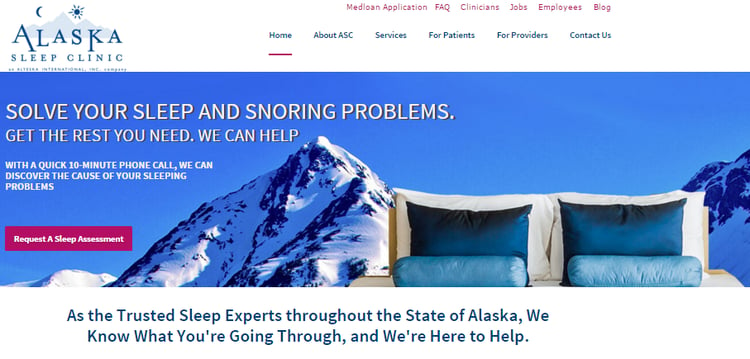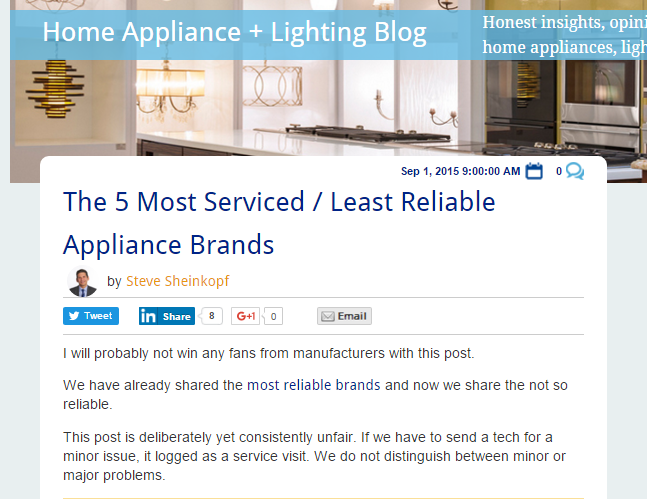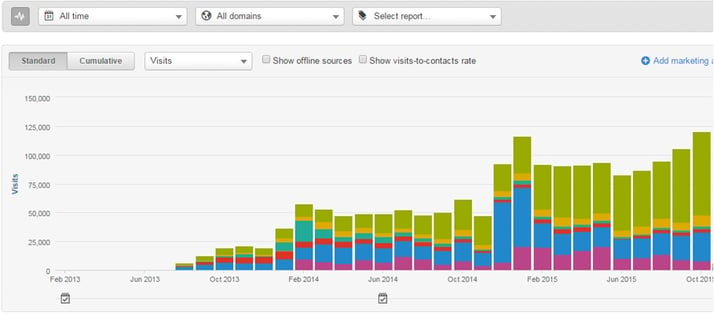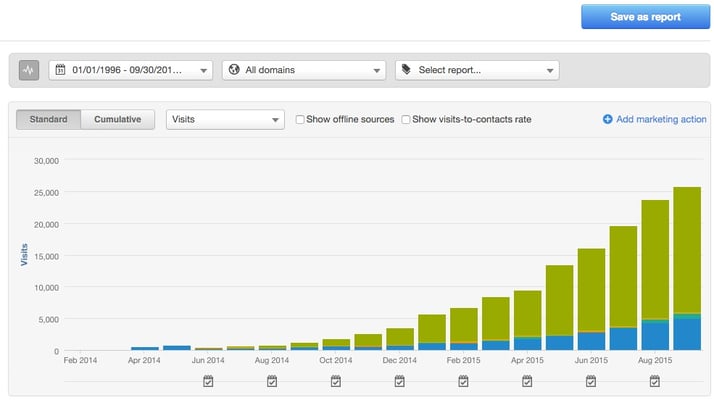Topics:
Content MarketingSubscribe now and get the latest podcast releases delivered straight to your inbox.
8 Qualities of the Most Successful Small Business Content Marketing Case Studies

Dec 1, 2015

Note from Marcus: A few years ago I had the pleasure of being hired by a health company in Alaska to assist them with their digital marketing efforts. In order to do this, we found and hired an in-house content manager by the name of Kevin Phillips. To make a long story short, Kevin would become a content marketing star for that company (as you will see), and once their organization was sold last year, I asked Kevin to join our team at The Sales Lion. Assuming you read this entire in-depth look at content marketing success for small businesses, you'll see why I made that choice :-)
When I first joined The Sales Lion, I knew of two really great stories of companies that had absolutely killed it in their field using the principles of inbound marketing: Marcus’s River Pools and Spas, and my own former place of business, The Alaska Sleep Clinic.
One of the first things I wanted to do upon joining The Sales Lion was to share my company’s success story with others.
The other thing I wanted to do was hear more from other companies that had experienced amazing results from doing content marketing. I knew that my own success couldn’t just be a fluke, or stroke of luck, as I had adopted HubSpot’s philosophy of inbound marketing and had approached my content marketing strategy in exactly the way Marcus had trained me to do: by employing his signature They Ask, You Answer methodology of answering typical-- even hard-- customer questions.
I had heard of other businesses that had used content marketing strategies to grow their online presence with incredible results, but I had never talked directly to any of these people; I never had an opportunity to compare notes on strategies.
I wanted to know exactly what others had done with content marketing to become successful. Were there certain strategies that they all used? Were there specific traits or qualities that they all shared? Did they have a similar journey as I had with Alaska Sleep, or had they done things completely different?
 The content marketing story of Alaska Sleep Clinic is an example of just how impactful content marketing can be on a location-based small business
The content marketing story of Alaska Sleep Clinic is an example of just how impactful content marketing can be on a location-based small business
I wanted to hear from other companies that had completely embraced content marketing, and used it to elevate themselves to the tops of their respective fields.
So that’s exactly what I did. I talked to just a handful of companies that had worked with The Sales Lion to get their content marketing engine fired up, and had then gone on to dominate the online conversation about their industry.
The backgrounds and areas of specialties for these companies are incredibly diverse ranging from a basement waterproofing company in Chicago to a retail appliance store in Boston to a financial information company out of Irvine, California. Some have been around for decades, and others have formed within the last few years.
But for as varied as these businesses may be, they all share a few qualities that have aided in their journey from having little to no online presence to having incredible amounts of traffic, leads, customers, and most importantly, respectable ROI’s for their efforts.
So what makes these companies tick? What fuel are they using to fire their content engines? Here are 8 qualities these highly successful inbound marketing companies share:
1. Priority on Consumer Education
Hands down, the most common quality all of these companies share is also the most important: they put client education first. They consider themselves teachers, mentors, and thought-leaders. And they’re successful at what they do because they genuinely care about giving people fair answers to the questions being asked online.
This mentality is apparent in the candid way they answered the simple question: What does inbound/content marketing mean to you?
“It’s telling your story, showing what you know, and what you do best in the world, and making that available to your prospective clients and customers in a way that is authentic.”––Ron Novak, Executive Vice President, Segue Technologies
“Content marketing is publishing educational, helpful material that is non-promotional on your website.” –Matthew Stock, President, U.S. Waterproofing
“It’s being able to answer a potential customer’s questions before they ever interact with you.”–Rob Misheloff, CEO, Smarter Finance
“Inbound marketing is teaching people using different types of content to educate the market around the topics people want to learn about.”–Paul Horstmeier, Senior Vice President, Health Catalyst
“Simply defined, it's just honest advice about a purchasing decision.”–Steve Sheinkopf, CEO, Yale Appliance
2. The Entire Company Believes in Content Marketing
All of the desire to properly educate clients couldn’t be possible if there wasn’t total buy-in from the top down. A successful inbound marketing strategy hinges on the collaboration and cooperation of everybody in the company. If buy-in is only found in the marketing department, the entire effort will inevitably suffer.
The companies I talked to don’t just have company wide buy-in, many of them have made participation a company policy, allowing everybody to contribute in some capacity. Most of these companies even have the CEO or high-level management employees overseeing and participating in the content engine.
Steve Sheinkopf, CEO of Yale Appliance, has contributed over 1,600 articles himself; Rob Misheloff, CEO of Smarter Finance USA, has written all of his company’s 100 plus articles; and Matthew Stock, President of U.S. Waterproofing, has over 400 articles under his name.
3. They Produce Their Own Content
Whether it’s one person doing everything, or over twenty people contributing, these companies do everything in-house. Misheloff is a one-man marketing team, Segue Technologies and Yale Appliance have everybody participate, and others like Health Catalyst have a solid marketing team.
One of the most common reasons companies outsource their content is because of the amount of time required to do inbound marketing right. But, what most of these other companies don’t get is that while it can be time consuming early on, it will inevitably save time by cutting down the length of the sales funnel.
One of the most important decisions for a company to make is whether to produce content in-house or outsource it to another agency. There are some pretty amazing agencies out there producing excellent content for their clients, and taking the time to weight the pros and cons of outsourcing content is an important part of the process. The most important question to ask is: who will be able to do it best?
Horstmeier of Health Catalyst sums up the benefits of having experts on staff:
"We were super lucky because the subject matter experts that we had were the subject matter experts nationally. We were in a new market and we were already the thought-leaders. we were the thought leaders, and we were already in demand.”
And for the companies that are concerned that they simply don’t have “good writers” on staff, here is what Sheinkopf has to say about having everybody in his company write a few articles a year:
“Some people are bad writers, I get that, but the other good part about getting everyone to blog is, theoretically, if everyone is blogging and really trying, they’ll learn to get better. If you spend a month researching a topic, you’re going to know what the heck you’re talking about on that subject.”
4. The Content They Produce is Educational, Honest, and Non-Promotional
It’s easy to say that you plan on creating educational content for your prospective clients, but it’s another thing to execute it well.
All too often we see “educational” content that is nothing more than thinly veiled advertisements (think native ads in newspaper publishing). These articles are supposed to be about the product, or service, or industry, and they’re supposed to be answering questions in a non-biased way, but all too often they’re written in a “we do this, we can do that, this is what we’re good at” way. These types of articles rarely gain the trust of the reader, as most readers are pretty much immune to boastful advertisements. And a successful inbound marketing strategy needs to be centered on a reciprocal nature of mutual trust between buyer and brand.
The companies doing inbound marketing the best really stick to the principles of creating content the consumer wants, and not what their company would like to give them. It should be about teaching rather than selling; explaining rather than persuading; giving answers rather than dodging questions.
Horstmeier best sums up why it’s so important to create content that is customer centric rather than marketer centric:
“I’ve found in my research that only about 30% of people actually trust brands. So for the most part, you have to start from the perspective that nobody trusts what you’re saying. “
Sheinkopf agrees that building a relationship based on trust is instrumental to any marketing campaign:
“Having people trust you is the key to it all. It goes back 150 years to a time when you trusted the person selling to you because you knew them personally. It’s selling in its most elemental and effective format: Earning it. Not talking about yourself. Talking about the customer and how you can improve their lives.”
Producing educational content paves a two-way street where the trust is beneficial to all parties. Customers get the information they need to make well-informed purchasing decisions, and the company has all the answers a person needs and is just waiting for people to ask the questions. And when doing it right, by the time a personal contact is made, the customer feels as if they already know you.
“One of the coolest things a customer ever told me was, “I knew I could trust you before I ever picked up the phone,” Says Misheloff.
5. They Aren’t Afraid to Tackle the Big Questions
Because their content is so open and honest, they know they have to answer all of their customers’ questions, even those questions that many companies would like to avoid. Doing it right means covering topics concerning costs, prices, comparisons, problems, reviews, and more.
Misheloff’s entire business strategy has been to educate his customers on the many scams found in his industry and give an honest assessment of what rates they may actually be looking at. Many people searching for small business loans online aren’t going to get the rates promised by his competitors. In fact, Misheloff’s business, Smarter Finance, is named after making customers smarter in their buying decisions.
“By listening to customers on the phone, we found that in the equipment financing industry people were just being lied to. These other companies knew that guys driving trucks don’t really know finance, and that they could just tell them anything. It was then that I started Smarter Finance USA. The point of smarter not being about me being smarter, but giving customers all the information they needed to make an informed business decision instead of lying to people and hoping they wouldn’t figure out the real interest rate.”
Yale Appliance has been so transparent and honest with their content that they have even be threatened with lawsuits regarding reviews they had done on products of certain major manufacturers. But Yale’s articles weren’t opinion based, they were based on real data about machines that required more servicing and repairs.
Sheinkopf even believes that these manufacturers, and not just the consumers, should be reading his articles to get a better understanding of how their products really perform.
“They may not like what I write, but it’s not up to me to make their product. They should take the advice of what’s wrong and build it back up so it doesn’t break. It’s the dumbest mentality (threatening a lawsuit). You shouldn’t shoot the messenger for delivering the message that other people are saying too.”
6. Marketing and Sales are United in Producing Content
As we’ve said, most of these companies have everybody in the organization helping to produce content in some way. Some of them use their sales teams to help generate new ideas based on questions they get asked on sales calls, others even have the sales team write content themselves. Whatever their method for producing content, one value stands firm: there is no separation between marketing and sales.
These companies realize the true value of their content efforts. The content they create is not just used in attracting people to the site. They use their content at every step of the buyer’s journey and the sales funnel.
“There was kind of a magic moment that occurred with our sales people who were answering the sales leads and working on B2B projects,” explains Novak, “When they started using their own content to answer questions they were getting over email, they really started to realize the value of what they were doing. It was pretty cool, they got asked these questions all the time, and all of a sudden they could respond by saying ‘I wrote an article about that question, and instead of taking the time to answer it again, I can just copy and paste a link to the article in the email.’”
Some of these companies have even implemented tools for their sales teams to use when making contact.
“We integrated content into our customer relation management tool pretty quickly,” says Stock, “I made it really easy for the sales guys as they didn’t have to go to the website and copy/paste an article’s link into an email. They are able to do it right in the CRM to better communicate with a customer more quickly by sharing immediate answers with them.”
Health Catalyst has taken their CRM to a new level by having a tool available on their website that allows anybody (the sales team in particular) to put any article they have online into a personal folder that can then be mailed to themselves, or if it’s a sales person, they can mail a selection of articles to a client.
7. They Have Seen Incredible Gains for Their Efforts
Traffic, leads, customers, praise, and profits. By implementing the principles of inbound marketing and putting the customer at the center of their efforts, these companies have reaped the benefits of their labor.
Traffic is the obvious first indicator that a content marketing strategy is working when articles start getting rewarded by search engines, followed by the amount of leads those articles start generating. However, an important discernment must be made between knowing the difference between regular leads and marketing qualified leads.
“We went from about 1,000 visits per month to 30,000 in just a few months,” says Novak, “I remember it was just insane how quickly things went up. We got to the point where we had to tweak our contact’s pages, because we were getting so many leads, and not all of them were the right fit for us. All of that traffic allowed us to be a little more choosy. We changed some of our questions and added a few additional ones on our contact forms. What it did was reduce the number of leads, but the quality of leads kept getting better.”
Many people are concerned about the amount of effort they have to put into their inbound engine versus the return on investment they can expect for their efforts.
“We went from 4,800 to 450,000 visitors,” says Sheinkopf, “So in terms of ROI, what is it? It’s my time, it’s my team’s time, you put our salaries together and it’s still way under what you’d spend on advertising. The ROI is fantastic. We can say that it’s at least 10 million dollars a year. And that’s off zero advertising.”
Doing content marketing right doesn’t simply lead to amazing growth through traffic, leads, and customers, oftentimes there are fringe successes as well. Matthew Stock of U.S. Waterproofing has become known as a thought-leader in his field and has many home improvement sites linking to his articles. He’s also been asked to speak at many PR events, and whenever local news stations need an expert to speak about the dangers of basement flooding, they contact U.S. Waterproofing first.
Paul Horstmeier explains the moment he knew his strategy was really catching onto success:
“About six months into it (doing content marketing) our President came to me and said, ‘in my 25 years in the health care field I’ve never seen anything like this in my history of selling. Our clients are coming and they are already educated. We walk into a meeting and they already know what we’re doing. They’ve read our stuff. They’ve already asked questions. Many of them are ready to buy by the time we have our first meeting.”
8. They Have Plans to Further Their Content Efforts
All of these companies have seen incredible success, and their efforts thus far could probably be enough to take them a long ways into the future. But one of the qualities that really makes them great is that they all believe that they need to take their marketing to the next level.
U.S. Waterproofing has recently begun offering live video Skype chats with customers. As a business that often has to respond to customer’s problems fairly quickly, live chats allow them to assess the problems in real time and get prospects the information they need much quicker to help them make a decision.
Health Catalyst has grown their online articles into regular webinars, and has even hosted an industry event twice. They turned their content marketing strategy into a full-fledged culture of educating the healthcare industry.
Segue Technologies plans on utilizing more video content into their production to help drive engagement with their clients.
Yale Appliance is also integrating more videos(see one of their videos below) and has even hired a professional chef to help create videos that show people how the appliances really work and compare with others.
Smarter Finance USA will also be getting into more video content while aiming to make the website more interactive for better customer experiences.
What really unites all these companies in their success is that they not only get the principles of inbound and use them appropriately, but the principles of inbound harmonize with their already existing business philosophies. They want to educate. They want to be trusted. They want to earn that trust. And they want to do it better than anybody else in their industry.


Order Your Copy of Marcus Sheridan's New Book — Endless Customers!





